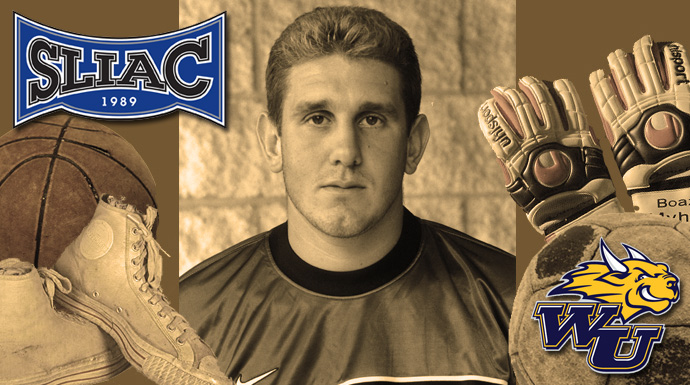
SLIAC; Looking Back with Jeff Reis
SLIAC; Looking Back is a weekly interview series each Thursday this summer with former players and coaches who made an impact during their time in the St. Louis Intercollegiate Athletic Conference (SLIAC). We hope you enjoy a look back through time and how the SLIAC played a role in who they are today. Today we speak with former Webster University two-sport standout Jeff Reis (Class of 2001).

|
| Jeff Reis |
Jeff Reis made his mark on the SLIAC during his time at Webster University on both the soccer field and on the basketball court. Reis was a two-time All-Conference goalkeeper for the Gorloks and was named the SLIAC Newcomer of the Year in 1998 and SLIAC Player of the Year in 1999; when he guided Webster to an undefeated conference record. On the basketball court you can still find his name in the record books where he holds the conference record for points in a game with 53. He was a two-time SLIAC Player of the Year and was inducted in the SLIAC Hall of Fame in 2007 and the Webster University Hall of Fame in 2010. Reis is currently the Women's Basketball Head Coach at Lindenwood University-Belleville.
You had numerous achievements while in the SLIAC, from setting the still standing Men's Basketball conference record for points in a game, to being named All-Conference in soccer as a goalie; what are some of your most memorable moments as a Gorlok?
"Being selected Studnet-Athlete of the Year at Webster my junior year and going to the NCAA Tournament in both soccer and basketball are some of my favorite memories. I wanted to stay close to home because my family was important to me. My dad was able to attend all of my basketball games. Now that he has passed away, having those memories with hime is extremely important to me."
What did competing in athletics at a collegiate level mean to you?
"I think that competing in intercollegiate athletics taught me leadership skills, both on and off the court. It definitely taught me respect and hard work. Today, I am able to challenge my student-athletes to compete at a higher level because I know that it is possible."
Was going into coaching something you always wanted to do? Was it part of your plan when you were playing?
"I have always loved sports and have known that I wanted to be involved in sports in some capacity after my playing career was over. I knew that I wasn't good enough to continue my playing career post college so coaching was the next best thing. I met my wife through coaching so it was obviously a good decision."
How has the game changed for you, going from a player to coach? Are your goals different?
"I don't think that my goals have changed; I am very competitive and I like to win. The most frustrating part of coaching is not being able to do it yourself--not being able to make a shot or change the game from that perspective. I have always appreciated the amount of time that it takes to be successful and I still spend a lot of time preparing from a coaching standpoint and I expect the same out of my staff and players."
There is a lot of talk today in regards to sports specialization among the youth; as a multi-sport athlete at Webster, what are your thoughts about playing multiple sports at a young age?
"I think playing multiple sports at a young age is important. I don't think that you really know what sport(s) you are going to enjoy and be really good at unless you try several different sports. It is an opportunity to connect with other student-athletes and form friendships on and off the court. I think an athlete would regret participating in just one sport in high school because it is such a unique and rewarding experience to play at that level. You learn different skills and experience different coaching types by participating in multiple sports. I learned a lot from soccer that I could apply to basketball. I also think that playing multiple sports helps you succeed in the classroom - always being "in-season" kept me focused on academics."
As someone who still works in college athletics, how have you seen athletics change in the decade and a half since graduating?
"I think that parents have taken a larger role in college athletics than they have in the past which I think takes away from what student-athletes learn and accomplish on their own. Student-athletes are more focused on the amount of scholarship dollars they will receive as opposed to just having the opportunity to compete; they seem more willing to give up if things are not going their way as opposed to focusing on getting better."












































































































































































































































































